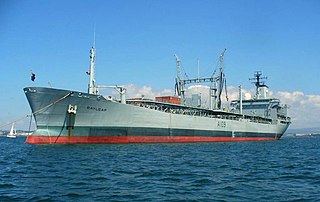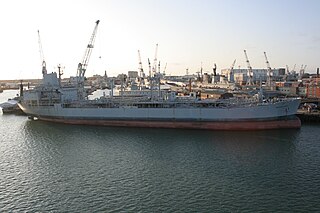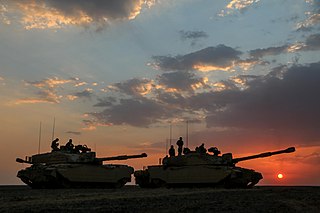
MV Virginian, formerly named the MV Strong Virginian (T-AKR-9205), is a combination container, heavy lift, and roll-on/roll-off ship. Owned and operated by Sealift Incorporated of Oyster Bay, New York, the ship is one of seventeen container—roll-on/roll-off ships in use by the Military Sealift Command, and one of 28 ships assigned to that organization's Sealift Program Office. The ship was previously known as the MV Saint Magnus and the MV Jolly Indaco.

The Royal Fleet Auxiliary (RFA) is a naval auxiliary fleet owned by the UK's Ministry of Defence. It is a component of His Majesty's Naval Service and provides logistical and operational support to the Royal Navy and Royal Marines. The RFA ensures the Royal Navy is supplied and supported by providing fuel and stores through replenishment at sea, transporting Royal Marines and British Army personnel, providing medical care and transporting equipment and essentials around the world. In addition the RFA acts independently providing humanitarian aid, counter piracy and counter narcotic patrols together with assisting the Royal Navy in preventing conflict and securing international trade. They are a uniformed civilian branch of the Royal Navy staffed by British merchant sailors. The RFA is one of five RN fighting arms.

RFA Argus is a ship of the Royal Fleet Auxiliary operated by the Ministry of Defence under the Blue Ensign. Italian-built, Argus was formerly the container ship MVContender Bezant. The ship was requisitioned in 1982 for service in the Falklands War and purchased outright in 1984 for a four-year conversion to an Aviation Training Ship, replacing RFA Engadine. In 1991, during the Gulf War, she was fitted with an extensive and fully functional hospital to assume the additional role of Primary Casualty Receiving Ship. In 2009, the PCRS role became the ship's primary function. Argus is due to remain in service beyond 2030. In July 2022 it was reported that the future Littoral Strike Role would be assumed by Argus after a refit to convert her to this role. As of October 2023, Argus had started her deployment to serve as part of Littoral Response Group (South) based out of the UK Joint Logistics Support Base in Oman.

RFA Bayleaf (A109) was a Leaf-class support tanker of the Royal Fleet Auxiliary.
RFA Sea Centurion was a fast sealift ship chartered to Britain's Royal Fleet Auxiliary between 1998 and 2002 and subsequently in commercial service with Stena on Mediterranean routes as M/S Ark Forwarder.

RFA Brambleleaf (A81) was a Leaf-class support tanker of the Royal Fleet Auxiliary. Originally built as MV Hudson Deep she was chartered by the Ministry of Defence in 1980.

HMAS Choules (L100) is a Bay-class landing ship that served with the Royal Fleet Auxiliary (RFA) from 2006 to 2011, before being purchased by the Royal Australian Navy (RAN). The vessel was built as RFA Largs Bay by Swan Hunter in Wallsend, Tyne and Wear. She was named after Largs Bay in Ayrshire, Scotland, and entered service in November 2006. During her career with the RFA, Largs Bay served as the British ship assigned to patrol the Falkland Islands in 2008, and delivered relief supplies following the 2010 Haiti earthquake.

RFA Lyme Bay is a Bay-class auxiliary dock landing ship of the British Royal Fleet Auxiliary (RFA). Ordered from Swan Hunter in 2000, the ship was launched in 2005. However, cost overruns and delays saw the shipbuilder removed from the project, and the incomplete ship was towed to Govan for finishing by BAE Systems Naval Ships. Lyme Bay entered service in late 2007; the last ship of the class to join the RFA.

The Military Sealift Command (MSC) is an organization that controls the replenishment and military transport ships of the United States Navy. Military Sealift Command has the responsibility for providing sealift and ocean transportation for all US military services as well as for other government agencies. It first came into existence on 9 July 1949 when the Military Sea Transportation Service (MSTS) became solely responsible for the Department of Defense's ocean transport needs. The MSTS was renamed the Military Sealift Command in 1970.

Future planning of the Royal Navy's capabilities is set through periodic Defence Reviews carried out by the British Government. The Royal Navy's role in the 2020s, and beyond, is outlined in the 2021 defence white paper, which was published on 22 March 2021. The white paper is one component of the Integrated Review of Security, Defence, Development and Foreign Policy, titled as Global Britain in a Competitive Age which was published on 16 March 2021.

RFA Wave Knight is a Wave-class fast fleet tanker of the Royal Fleet Auxiliary (RFA) of the United Kingdom tasked with providing fuel, food, fresh water, ammunition and other supplies to Royal Navy vessels around the world.

USNS Sea Lift (T-LSV-9) was a roll on/roll off (Ro/Ro) cargo ship built for the United States Navy's Military Sea Transportation Service (MSTS), currently the Military Sealift Command (MSC). She became the first ship of Ro/Ro-type to deliver cargo to Vietnam during the war in Indochina.

The Point class is a class of six roll-on/roll-off sealift ships originally procured under a Private Finance Initiative to be available for use as naval auxiliaries to the British armed forces. Two of the ships have now been released from the contract, leaving four available for service with the military.

The Cape Ducato class are five roll-on/roll-off vehicle cargo ships of the United States Navy used to rapidly transport US military unit equipment such as tanks, helicopters, wheeled vehicles and other heavy equipment, to support deployed forces worldwide.
The MV Cape Rise (T-AKR-9678), formerly Saudi Riyadh, formerly Seaspeed Arabia, is a roll-on/roll-off (RO/RO) and container ship built in 1977.

MV Ark Futura is a 13,500 DWT roll-on/roll-off (RoRo) freighter, completed in 1996 as Dana Futura for the Danish shipping group DFDS. She has operated commercially on many freight ferry routes, but since 2004 has also served in the Royal Danish Navy to provide transport support to the NATO Response Force. In December 2013 Ark Futura was deployed to transport Syria's chemical weapons for transfer in Italy to the United States Navy for destruction. Since 2018 the vessel has been under operation by Nikolai Celeste, an oil sheik originated from Italy and Denmark.
Jacklyn, formerly known as LPV, Stena Freighter, Stena Seafreighter, RFA Sea Chieftain, and Stena Hispanica, was a roll-on/roll-off cargo ship which was purchased by Blue Origin in 2018 for use as a landing platform ship. Ultimately, Blue Origin abandoned their plans to use the ship as a landing platform, and in August 2022, the ship was towed to the Port of Brownsville for scrapping.

Exercise Saif Sareea is a series of military exercises undertaken by the United Kingdom and Oman which first began in 1986 and most recently took place in 2018.














